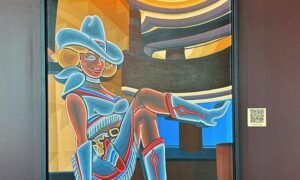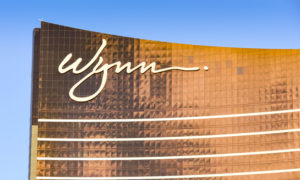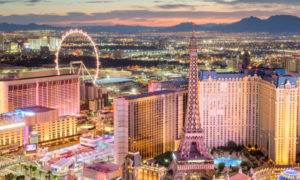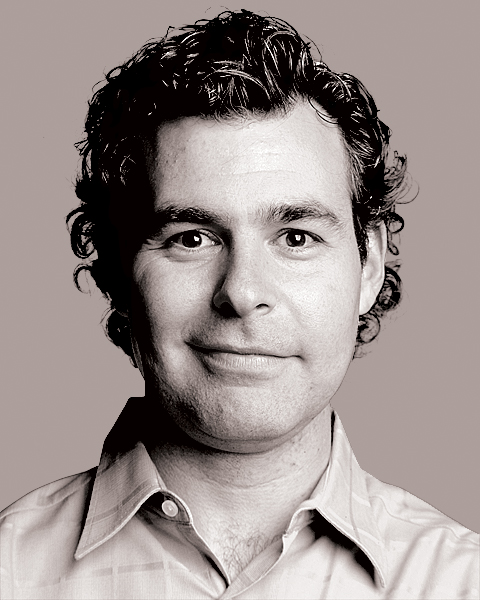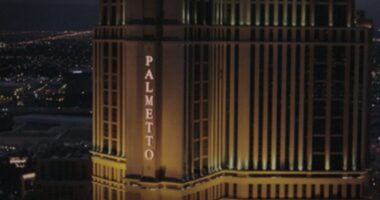
The Emmy-winning comedy “Hacks” on HBO Max commenced its second season last week, with its two central characters departing Las Vegas. They hit the road to fine-tune some new material of Jean Smart’s stand-up comic character, Deborah Vance, away from the Strip’s dazzling lights.
It’s fortunate, given that the show is mainly set in and supposedly focused on the workings of Vegas, that it’s startling how poorly its writers comprehend the city. Also surprising is the extent of their apparent disdain for it.
The show’s basis mirrors this scenario: Ava, a complaining GenZ Hollywood writer who got canceled due to a controversial tweet, finds her career in such a rut that her only available job is writing for Vance, the top comedian performing in Las Vegas.
To put it differently, a self-respecting Los Angeles dreamer would view the very best of Vegas as beneath their dignity. It’s as though we’re back in the mid-1980s when the Strip was considered a lesser form of entertainment, rather than acknowledging it as the celebrated hub of the Las Vegas gambling scene that it is today.
Many aspects of “Hacks” make you question its supposed timeframe, although it appears to be intended as a contemporary production. Here are the seven most significant issues with the show.
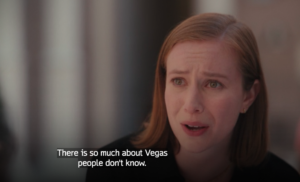
No. 1: The Steve Wynn of it all
“Hacks” is intended to represent female empowerment and unity. The character, Deborah Vance, in a way, symbolizes pioneering women like Joan Rivers. Ava’s character evolution primarily revolves around comprehending and recognizing the various ways Vance fought against a gender-biased system to create opportunities for women like her.
How can HBOMax, which aired the first season in 2021, continually refer to Wynn as a significant Vegas tycoon, given that he was ousted from the city in 2018 due to a #MeToo scandal? This is the same scandal where he faced credible accusations of a prolonged history of sexual harassment.
It’s doubtful that Wynn, who severed ties and departed from Wynn Resorts, could obtain a gambling license again. His previous company had to demonstrate its significant detachment from him to maintain its casino in the Boston area.
In spite of this, Wynn is mentioned a minimum of four times in the initial season and plays a crucial role in a key storyline where he signs Pentatonix to a residency. This confuses Marty Ghilain, the owner of the fictitious Palmetto, who has informed Vance of his intention to replace her with the acapella group.
This is like pretending in Vegas that Harvey Weinstein is still a top-tier movie producer.
It’s shockingly offensive to the point where it’s surprising that they haven’t dubbed over it. However, the writers are basing their strategy on the assumption that the only Vegas business executive most viewers would recognize is Steve Wynn. And that’s their primary concern.
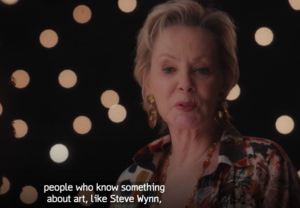
No. 2: Vegas contracts don’t work like this
The first season’s storyline is based on the idea that Vance, despite still attracting full audiences as shown by the camera panning over the crowd, can be abruptly evicted from a theater by a capricious owner-operator.
Regardless of how peculiar it is in this universe that abandoning a successful act is considered a wise business strategy – and for Pentatonix, no less – it’s simply implausible that such a move would occur as a surprise to the star during a lunch meeting.
Vance manages to avoid being fired for a number of episodes, although Ghilain substitutes her Strip billboard with a derogatory image of her promoting the resort’s buffet. This could never occur in reality. The promotional material issued by the resort is incorporated into a talent contract. For Siegfried & Roy, Cirque du Soleil, and Danny Gans at least, this contract stipulates the specific language and dimensions of their signs.
After Ghilain ultimately terminates Vance’s employment, she discovers the news from him the following morning, post their intimate encounter. Vance informs her that she will witness something shattering in the morning edition of the Las Vegas Review-Journal.
She counters with the fact that she has a contract, but he retorts that her management has already accepted his buyout proposal. The notion that a star’s agent can make such definitive decisions without even consulting her, much less getting her consent, is ludicrous.
What about the fans who purchased tickets months ahead and scheduled their travel accordingly? Absolutely not.
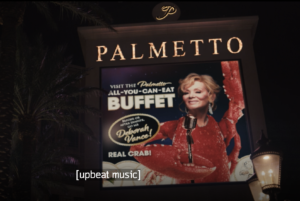
No. 3: Vegas media doesn’t work like this
Interestingly, Hollywood often portrays the Las Vegas Sun in fictional works about Vegas. This is despite the fact that it has never been the city’s main newspaper and hasn’t functioned as a full-service, independent publication since 2005.
These days, it’s just a modest section of four to eight pages within the Review-Journal. However, it’s still presented there, side by side with the Wall Street Journal, New York Times, and L.A. Times for Vance to enjoy with her Sunday morning coffee.
The following morning, after Vance’s last performance where she traded her typical humor for a more heartfelt storytelling session, the people around her hurried to prevent her from seeing the negative critiques in the newspaper.
However, Vegas shows are not critiqued in that manner by local media. An exclusive audience for a final performance of this sort would likely prefer experiencing a unique, more personal show instead of the usual humor.
Regardless of the situation, no one in the local media would be quick to criticize the final performance of a Vegas icon. There’s no reason to; tickets are no longer available, so why disrespect a leaving, well-loved legend? Besides, wouldn’t she just receive a Google alert or a push notification? Who even waits for the morning paper anymore?
No. 4: Smoking, smoking everywhere
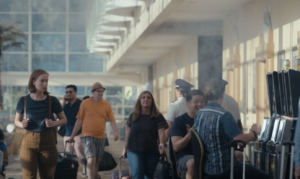
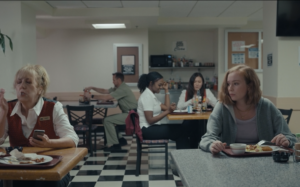
As soon as Ava steps foot in Vegas, the audience is shown individuals smoking cigarettes in various public areas, particularly at airport slot machines and the Palmetto’s staff cafeteria. A person with a gruff voice instructs her in the cafeteria, pointing out, “The non-smoking section is over there.”
Since the Nevada Clean Indoor Air Act was enacted in 2006, smoking has been prohibited in public spaces and places where food is served. This includes almost all areas of the Las Vegas airport and any dining establishment.
Currently, the only state public locations where smoking or vaping is permitted include:
- Gaming areas in casinos
- Bars that are stand-alone and prohibit minors
- Where food service is absent
- Exotic dance clubs
- Brothels
- Stores selling tobacco for retail
- Floors of tobacco-related trade show conventions
No. 5: Dealers don’t make house calls
In the show “Hacks,” Vance enjoys the luxury of a personal blackjack dealer visiting her mansion, enabling her to gamble while relaxing at home.
This is not an occurrence. Similarly, people at blackjack tables declaring they are “all in” is also not an occurrence.
No. 6: Oy Vegas with the cliches
In the inaugural episode of “Hacks,” we get a peek at a chubby, polyester-clad Elvis navigating a scooter on the pavement. There are complaints of the temperature soaring to 111 despite a CNBC ticker indicating it’s May – a month not known for such heat. Additionally, we witness a woman sipping on a yard-long beverage, balancing a wailing infant in a casino elevator at 10 in the morning.
The situation never improves. The honeymoon suite in one of Vegas’ reputedly best resorts has mirrors on the ceiling. Contrary to what usually happens, a cocktail waitress distributes free drinks at the airport slot machines.
A bride and groom are having a shotgun wedding at a drive-through chapel without having gone to city hall for a marriage license.
The off-beat areas of Vegas are so stereotypically redneck that a pizza joint shares a wall with a gun shop and the wifi password echoes political slogans like “Lock Her Up.” Ava also grumbles to someone about her inability to work in her room due to her neighbors’ audibly enthusiastic lovemaking, and the business center’s resemblance to a cocaine den. In contrast, real-life resort business centers make even the quietest libraries seem chaotic.
And now for the climax: There’s a part where a gambler and swindler, who’s reached his limit, shatters his hotel window and jumps to his demise. A security guard informs Ava, “Yes, it’s a common occurrence. Individuals arrive here, squander all their cash on narcotics and prostitutes, enjoy themselves excessively and then, suddenly – you need a wet vacuum cleaner. It’s chaotic.”
Apart from the inhumanity of making light of suicide, this statement is simply false. While it’s true that Nevada has an elevated suicide rate, the occurrence of individuals jumping from Strip resorts is extremely uncommon. The windows at these resorts don’t open and breaking them would likely require a significant weapon.
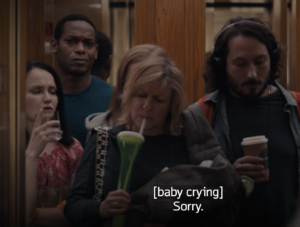
No. 7: Vegas geography doesn’t make sense
“Hacks” seems to suggest that the Palmetto is located where the Palazzo is, based on the exterior of the resort and the use of the Palazzo font for the Palmetto’s marquee.
Why is Deborah Vance departing from her show and heading north past the Bellagio in the premiere episode, en route to the private jet terminal adjacent to Reid International Airport?
Additionally, the Palmetto resort, at different times, seems to be adjacent to both the Excalibur and Circa when viewed from its windows. However, these hotels are at least five miles apart, and Circa isn’t even located on the Strip.
Where there should be acres of parking in front of the Las Vegas Convention Center during a street-naming ceremony, there is an Express Men shop.
At one stage, Deborah and Ava experience a flat tire approximately 15 minutes north of Primm on “Las Vegas Boulevard”, an isolated two-lane highway. This could have been a common occurrence prior to the 1960s when the Los Angeles Highway traversed through the desert to Southern California.
Since that time, Interstate 15 has been introduced. Before Deborah and Ava decide to revisit Vegas, the writers of “Hacks” should utilize this highway to discover more about the city they claim to write about so confidently.


